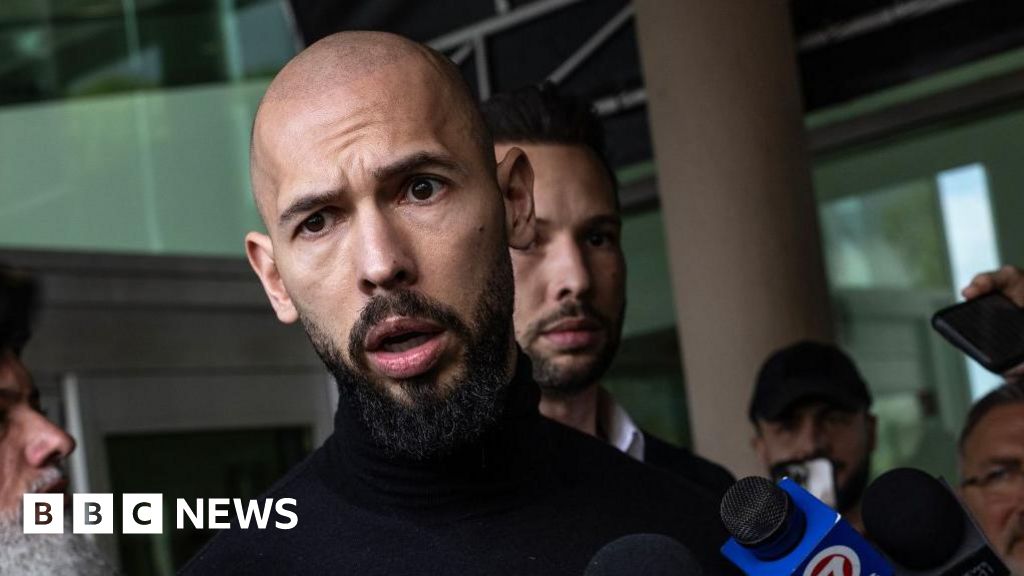Andrew Tate, the controversial social media figure, is facing a new lawsuit by his ex-girlfriend, accusing him of sexual assault, battery and gender violence.
The lawsuit filed by Brianna Stern in Los Angeles details their relationship and how Tate initially seemed like a “dream come true” but then she claims he became emotionally and physically abusive.
It details a violent encounter that allegedly took place on 11 March at The Beverly Hills Hotel, where she alleges she was assaulted and threatened.
In a statement to the BBC, Tate’s attorney dismissed the allegations and called the lawsuit a “blatant cash grab”, accusing Ms Stern of levelling the accusations for “money and attention”.
Warning: Contains references to sexual violence.
“Andrew’s legal team stands ready to defend him fiercely in court, where the truth will expose this baseless scheme,” Joseph McBride told the BBC.
Mr McBride also attacked Ms Stern’s attorney Tony Buzbee, who is representing dozens of victims alleging sexual assault against Sean “Diddy” Combs, calling him a “lowlife bottom feeder”.
The lawsuit comes as Tate continues to face serious legal challenges in multiple countries.
In 2022, he and his brother Tristan Tate were arrested in Romania on charges of forming a criminal organisation, with Andrew Tate also facing rape charges in the country.
Additionally, both brothers have been accused of sexual assault in the US and the UK, though neither has been convicted of any crimes.
The lawsuit describes a pattern of alleged manipulation and grooming that began when Ms Stern first met Tate in Romania, where she had travelled for a modelling job in the summer of 2024.
Tate told Ms Stern that he takes care of the women he dates and that she would not have to work if they were together, according to the lawsuit.
Initially, Tate presented himself as charming, but Ms Stern alleges that his behaviour quickly turned demeaning and threatening.
According to her claims, he referred to her as his “property” and subjected her to verbal abuse, calling her an “idiot,” among other names.
She described one incident in the Beverly Hills hotel that he beat, choked and then threatened to kill her while they were having sex – an encounter that she says began as consensual.
“Tate began verbally degrading Plaintiff as he routinely did – but this time it was much worse, more aggressive, and more violent,” the lawsuit states.
Ms Stern said in the complaint that he struck her in her face and head, and she cried for him to stop – alleging at one point the pressure on her neck nearly made her lose consciousness.
“Tate told her repeatedly that if she ever crossed him, he was going to kill her,” the lawsuit states.
It claims that after the episode, Ms Stern acted as though nothing was wrong in hopes of safely leaving the hotel in the morning.
She later sought medical attention, where a physician told her she had “post-concussion syndrome”.
Tate allegedly messaged Ms Stern: “if you ever betray me you will regret it”. The lawsuit states she waited until he left the country to report the assault to law enforcement.
Along with punitive damages, she says in the lawsuit that she is requesting a restraining order and is hoping the legal action will stop “Tate from his pattern of using and abusing women”.
The amount she is suing for was not listed but the lawsuit asks the court for statutory damages, attorney and court costs and any “further relief as the Court may deem just and proper”.
Following the lawsuit being filed, Ms Stern posted a statement to her Instagram account, saying she still loved Tate despite the accusations she levied.
“It was honestly hard for me to accept that I was being abused,” she said.
Tate has yet to personally comment on the lawsuit.
A list of organisations in the UK offering support and information with some of the issues in this story is available at BBC Action Line.
